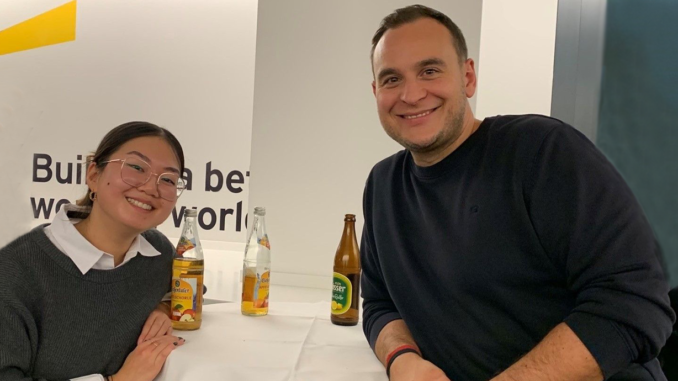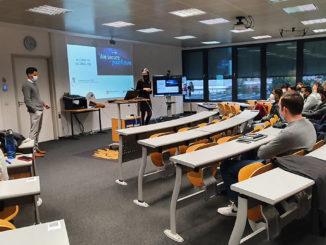
At Munich Business School, we place a strong emphasis on mentoring. There are numerous cross-course mentoring programs at MBS – and our university’s Chancellor wrote her doctoral thesis on the topic. We met with Dr. Christine Menges, Chancellor of Munich Business School, Prof. Dr. Patricia Kraft, Academic Director of the International Business bachelor’s program, and Alumni Relations Manager Martina Dengler to discuss the value of mentoring at universities.
MBS Insights: Dr. Christine Menges, as someone who wrote her doctoral thesis on mentoring, and given your position as Chancellor of Munich Business School, could you briefly explain what mentoring is and why it matters?
Dr. Christine Menges: You might not believe it at first, but mentoring is a very old concept. Mentoring actually has its roots in Greek mythology. In his Odyssey, Homer tells how Odysseus asks his friend, Mentor, to watch over his son, Telemachus, and raise him during his absence. Mentor looked after Telemachus, sharing his experiences and contacts with him, introducing him into society and supporting his development as an individual. As a result, mentoring in the traditional sense came to be defined as promoting someone’s personal and professional development, with a more experienced, usually older person (mentor) supporting a younger, less experienced person (mentee) for a period of time. Of course, the traditional concept of mentoring has changed somewhat as it developed into what we understand as mentoring today. There are now different forms of mentoring, including group mentoring, reverse mentoring, and so on. However, one thing common to all mentoring programs and relationships is that they facilitate a transfer of knowledge and produce new contacts, perspectives, motivation, ideas and impressions – not only for mentees but for mentors as well.
MBS Insights: The MBS Mentoring Program, which connects MBS alumni and MBS students in the form of one-to-one mentoring, was expanded in the Fall semester to include our bachelor’s students. It had previously only been available to master’s students. Prof. Patricia Kraft, how did you arrive at this decision and, as its Academic Director, what do you hope this will bring to the bachelor’s program?
Prof. Dr. Patricia Kraft: Mentoring programs are about establishing a long-term relationship and a continuous exchange of experiences. Our MBS alumni network includes so many wonderful individuals and we believe that even more people should benefit from their wealth of knowledge. This is why we decided to expand our mentoring program to include our bachelor’s students. The program enables our bachelor’s students to engage with a variety of topics and develop extensively as individuals over a three-semester period. It also offers us, as a university, the opportunity to create links between students and alumni while strengthening the MBS community.
Personally, I hope that expanding the mentoring program will provide even better support for students in their first few semesters and, instead of simply ending after a few semesters, will lead to a long-term relationship and a higher degree of trust between the mentor and mentee. It could lead to anything, from assistance overcoming challenges to finding an internship, a recommendation for a first job or just becoming part of a professional network.
MBS Insights: Effective matching is crucial for a successful mentor-mentee relationship. Martina Dengler, as Alumni Relations Manager, you have supervised the mentoring program for several years and so have extensive experience. What aspects do you consider when selecting mentors? What skills do they need to have? And what factors are decisive in making a solid match?
Martina Dengler: A good mentor should be a role model, an advisor, a confidant, a critic, a supporter and a networker. Aside from their years of professional experience, it’s obviously also important that mentors are motivated to use their experience and expertise to support current students and devote the requisite time to the mentoring relationship. A successful match is based on a range of criteria. In addition to similar specialist interests, such as brand management, I also pay particular attention to ensuring that the ‘chemistry’ is right. For a mentoring relationship to be successful, it’s essential that the mentor and mentee’s personalities are compatible and that they share similar values. Only then is it possible to establish a trusting, genuine, open exchange. However, it’s important that the mentor and mentee don’t have exactly the same interests and life experience, so that each can provide new insights and ideas. It’s about finding a good balance between similarities and differences.
MBS Insights: In addition to one-to-one mentoring, MBS recently launched another mentoring format: the MBS Female Leadership Lounge, aimed specifically at our female students. How is this program different to traditional mentoring and what are its aims?
Prof. Dr. Patricia Kraft: As a means of expanding and developing our Women in Leadership initiative, which we launched at MBS in 2016, we selected 12 female applicants from all our study programs – from bachelor’s and master’s students to MBA candidates – to participate in the MBS Female Leadership Lounge. This year-long program offers targeted mentoring on leadership from two C-level managers: Anna Kopp from Microsoft and Rita Niedermayr from Ernst & Young.
Dr. Christine Menges: Unlike the mentoring program for our bachelor’s and master’s programs, it concentrates more closely on a specific topic: female leadership. It also uses a different format. We consciously opted for group mentoring so that everyone can benefit equally from the C-level mentors and so the students can inspire and empower each other, growing together as a group of prospective female leaders – who are, unfortunately, still disadvantaged and underrepresented in the world of work. By the end of the program, the students will have expanded their network, gained insights into leadership, and developed personally and professionally through their experience with these role models.




